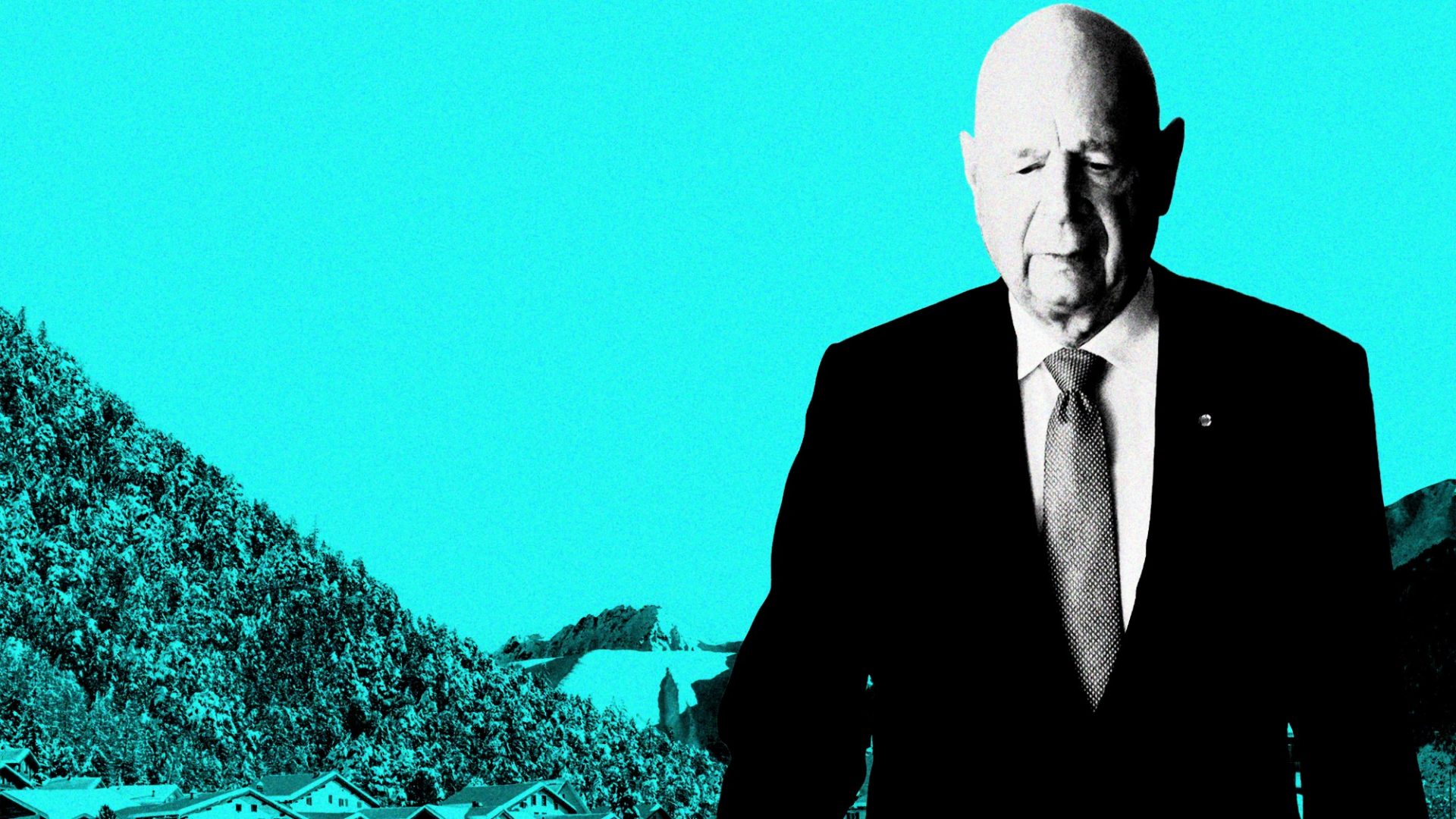On Monday April 21, the 87-year-old supreme leader of a global institution departed the stage for the last time – but Klaus Schwab’s retirement from the World Economic Forum (WEF), which hosts the Davos summit every January, was somewhat overshadowed by the death of 88-year-old Pope Francis.
Nonetheless, some people took note of the concurrent events. Republican congresswoman and conspiracy theorist Marjorie Taylor Greene appeared to join the dots between the two events in a post on X that afternoon. “Today there were major shifts in global leadership,” she said. “Evil is being defeated by the hand of God.”
Schwab was both the founder and the executive chairman of the WEF, an organisation that regularly brought together the world’s most powerful business leaders with its most influential politicians – a place where backroom deals are hammered out, connections are made, and agendas are set.
Admirers and critics alike agree he has a strong claim to be the father of what’s come to be known as “globalism” – to its adherents, a philosophy that says global problems need global solutions, but which to its most virulent critics represents an anti-democratic ideology that attempts to impose a one-world government by nefarious means.
On paper, the WEF appears little more than a middling-sized not-for-profit organisation, but it has always punched above its weight, making Schwab and Davos the focus of almost as many conspiracy theories as the pope and the Catholic Church. His decision to publish a book named The Great Reset during the Covid lockdowns only encouraged the wild fantasies. But as Schwab announces his retirement, what does that mean for the WEF – and for globalism itself?
If nationalists and populists could invent a face of globalism, they would almost certainly come up with a figure like Schwab. Born in Germany, Schwab studied for not one but two doctorates (in economics and engineering) in Switzerland. He then took a Master’s in Public Administration at Harvard, at a time when Henry Kissinger was teaching at the school and took him on as a protege.
All of this makes him exactly the kind of internationalist, ultra-elite figure that the populists love to despise. Multiple online memes take the story even further though, suggesting that Schwab is also a member of the Rothschild banking dynasty on his mother’s side – though in reality, while his maternal grandfather did indeed have that surname, he was not related to the banking dynasty.
By the age of 33, he had founded the European Management Forum, the organisation that would become the WEF, and it held its inaugural Davos meeting in 1971, at the time attracting business leaders only.
Schwab’s aims were explicitly global. He wanted to introduce European business leaders to innovations in American management and business practices, but at the same time he wanted Americans to embrace the particularly Germanic idea of stakeholder capitalism. This is the idea that companies are responsible to their employees, customers and societies, rather than just their shareholders.
As a result, the WEF was subjected to fire from both sides from its very inception. To those of the left, it represented the advance of untrammelled global capitalism, helping business leaders and politicians to cut deals without the scrutiny or even presence of the public. But to hardcore capitalists, Schwab’s insistence that business should come with social purpose, and the idea that corporations have wider social obligations, is an unforgivable violation of the free market ideal.
Despite this flak, the forums proved popular and grew rapidly. In 1974, the first politicians were invited to the annual Davos gathering, and by 1987 the European Management Forum was officially rebranded as the World Economic Forum, reflecting its expanding ambitions to serve as a “platform for resolving international conflicts”. It was a lofty goal, especially for a privately-run not-for-profit organisation, with no connection to official diplomatic channels.
Insiders and former insiders stress that a large part of the WEF’s success came from that lack of official status, and the relative informality that goes with it. While Davos always has a packed official programme and agenda, much of its pull comes from the unofficial meetings that can occur between world leaders.
“Consider, say, the protocol-heavy complexity of getting a Xi-Trump phone call,” said one Davos insider. “Making space for important informal conversations is pretty vital.”
Some of the most tangible results of Davos summits have concerned public health. The Global Alliance for Vaccines and Immunisation initiative came out of a Davos summit in 2000, as did the Coalition for Epidemic Preparedness Innovations more than a decade later.
These were obvious targets for an organisation like WEF: the problem was that billions of people were facing the prospect of getting ill and potentially dying from diseases that were preventable with low-cost vaccines routinely available in rich countries. Working out how to get those vaccines in large numbers, to the right people, with the right staff to administer them – and working out who would pay for it all – would need a coalition of nations, global bodies like the UN, and pharmaceutical companies.
Inevitably, when the vaccine organisation went on to participate in the response to Covid, conspiratorially-minded people immediately traced its development back to the WEF and to Schwab, who had published The Great Reset.
To Schwab, this was simply him doing what he and WEF always had done: setting out ideas on how businesses and governments might respond to global crises. He’d done this for the preceding five decades, in the aftermath of recessions, oil crises, the financial crash, and other disasters. But to the Covid conspiracy theorists, he was merely openly confirming what they had feared – that the pandemic was a manufactured crisis designed to further a globalist agenda.
The WEF’s habit of publishing provocation papers – in which politicians, academics or others imagined different future situations – added fuel to the fire. When a paper titled “You’ll own nothing and you’ll be happy” was discovered, people saw a plan laid bare.
Schwab and the WEF had made such conspiratorial thinking inevitable, though, not least because their very existence and mode of operation raised numerous legitimate questions as to how the world is run. Citizens tend to expect transparency and accountability from their governments, even though such transparency can make the business of government much harder.
By creating a private forum for meetings, and the informality to keep them off the books, Schwab bypassed these kinds of accountability mechanisms – creating a blank space in which those of us shut out of the golden circle will inevitably fill in the details with our imaginations.
Those who have worked for or with the WEF generally, though, suggest that Schwab’s intentions were largely benign. The reality of the vaccine work was that hundreds of millions of people were vaccinated – and meant there was at least some infrastructure in place to consider how to get Covid jabs to poorer countries during the pandemic.
Similarly, the WEF worked to raise the importance of climate policy among global business leaders – at least until Trump got back into power this year, and made such policies a significant political risk for US businesses.
But at the same time as Schwab promoted his governance initiatives, his personal dominance of the WEF became a weak point in the organisation’s own governance. Schwab was not just the CEO of WEF, but also its chairman, and he worked for decades past any normal retirement age – serving as the WEF’s driving force right up until last week.
Schwab had reportedly been planning to depart this year for some time, but the timing of his exit was accelerated last week after WEF’s board received complaints about his conduct and demands he was making of WEF staff. These allegedly included asking them to submit his name for consideration for the Nobel Peace Prize, making large cash withdrawals on his behalf, using company money for private records, and even personally manipulating the rankings of WEF scorecards to do favours for particular government leaders. Its board is now investigating those complaints.
Schwab’s board has included figures like former US vice-president Al Gore, European Central Bank chief Christine Lagarde, Canadian PM Mark Carney, and numerous other such luminaries, but none of them were an effective check on Schwab, who did whatever he wanted. Sometimes taking some sharp public relations blowback.
The WEF sits on a huge cash pile for an organisation of its size, and other than a real estate purchase or two (such as a very nice villa), it seems unable to find any worthwhile initiatives to spend it on.
Schwab’s organisation now risks looking both rudderless and out of ideas at a time when its whole ethos is under attack. The president of the USA is undermining the very basis of global trade, let alone globalism. Leading figures like Keir Starmer have declared that the era of globalisation is now dead.
The United Nations is now a largely ineffective talking shop, which is part of what made organisations like the WEF important. But it has a large and divided board, no obvious successor with Schwab’s profile, and no big public counter-argument for the nationalist agendas on the rise across the world.
Klaus Schwab worked for five decades to create a vision of global capitalism that cared about society, too – that wanted to make the world better, fairer (at least to an extent), and wanted to address issues like climate change. It is not clear whether his vision, or the WEF’s influence, will outlive his tenure. It is even less clear what might replace it.




